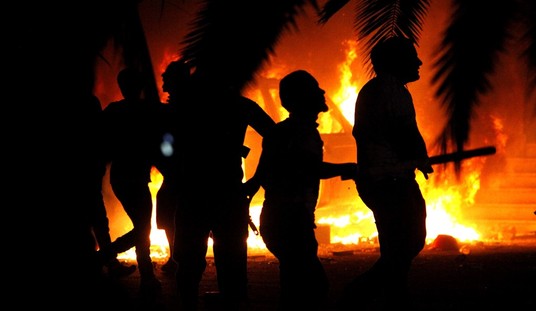Over the last two months, Barack Obama has called for regime change in places where old foes ran dictatorships, such as Libya, and where American allies ran autocracies that suited us for decades, as in Egypt. So far, though, the President hasn’t seen fit to call for regime change in countries where current foes brutally suppress dissent in similar or worse manners than in either country, such as Syria, where dictator Bashar Assad had his security forces open fire repeatedly on demonstrators. According to the State Department, Obama won’t start with Iran, either:
Robert Einhorn, the State Department’s special adviser for nonproliferation and arms control, said Washington was not now directing its efforts toward changing the regime that governs Iran.
“We may not like this regime in Tehran — in fact, we don’t like this regime in Tehran — but we believe that this regime will be changed when Iranian people decide it needs to be changed, and by the Iranian people,” Einhorn said.
Einhorn said U.S. policy was aimed at changing Iran’s behavior concerning its nuclear activities, its human rights record, and what he described as Iranian support for terrorist groups.
At the New Republic, Abbas Milani wonders — where’s the outrage?
For 42 years, the world did business with Muammar Qaddafi, even as it knew about the brutality he was inflicting on his own people. Too often, there was no outrage in the West about Qaddafi’s crimes. Now, if the same pattern is not to be repeated in Iran, one must ask: Where is the outrage about that country’s endemic brutality and its kleptocratic theocracy? Specifically, where is the outrage about the fact that the four leading figures of the Green Movement—Mir Hossein Mousavi and Mehdi Karubi, as well as their equally defiant wives, Zahra Rahnavard and Fateme Karubi—have been under arrest now for six weeks? While military intervention in Iran is not an option as it was in Libya, it would still be helpful and morally justified if the world didn’t forget about the serious crimes that are taking place there on a daily basis—and if American leaders showed more consistent outrage about the plight of the Iranian people.
Over the course of three decades, the Islamic Republic has unleashed a reign of terror on Iran, arresting tens of thousands, executing several thousand, and forcing some three million Iranians—including hundreds of journalists, writers, dissidents, scientists, physicians, scholars, and entrepreneurs—into forced exile. In 1988 alone, according to numerous credible reports, on direct order of Ayatollah Khomeini, close to 4,000 prisoners, serving time on earlier charges, were summarily executed in what was clearly a crime against humanity. If one adds up all the bloodshed and violence in Iran since 1979, there is hardly a regime in the Middle East, including Syria’s and Libya’s, that has shed as much blood and caused as much heartbreak to keep its despotic hold on power. The ruling regime in Iran—effectively at this point a partnership between Ayatollah Khamenei and the Iranian Revolutionary Guard Corps—is literally and metaphorically getting away with murder.
Yet, in recent weeks, even as Tehran has put Green Movement leaders under house arrest and cracked down on protesters, developments around the world have helped it to escape scrutiny. There have been occasional exceptions to this pattern—such as a strong March 21 Persian New Year message from President Obama, in which he made clear that he stands with the democratic aspirations of the Iranian people—but, for the most part, the revolt in Egypt, the war in Libya, and the devastating earthquake in Japan have pushed Iran off the front pages. Moreover, the ill-advised Saudi incursion into Bahrain has provided the Iranian regime with an occasion to grandstand about siding with the democratic aspirations of the people there.
Milani’s sop to Obama aside, the President has hardly been visible on Iran at all. In fact, even though Obama has mainly avoided talking about Syria, his administration at least has discussed the brutal repression in that country over the last few weeks. He hasn’t even done that much with Iran, who rounded up its opposition quietly while the so-called Arab Spring captured attention all over the world. The Persian New Year message was a one-off throwaway, for which the White House provided no follow-up.
Obama wants to preserve the lines of diplomacy in order to keep the possibility of talks open on Iran’s nuclear efforts. Well, the lines of diplomacy were open in Cairo, where Obama could have assisted a US ally into a smooth transition that would have allowed sufficient time for opposition groups to form political parties and balance out the existing organization of the Muslim Brotherhood. Egypt presented no threat to the US at all, and in fact provided a stabilizing presence in its detente with Israel. Yet Obama had no trouble calling for the resignation of Hosni Mubarak and putting that detente at serious risk while refusing to challenge the mullahs of a country that represent a critical threat to the entire region.
Now we’re presently in a military conflict with another brutal dictator that didn’t threaten our security, according to Obama’s of Secretary of Defense, pursuing regime change in Libya while turning a blind eye to Iranian oppression in support of a two-year policy that has produced no results at all. Outrage, indeed.








Join the conversation as a VIP Member